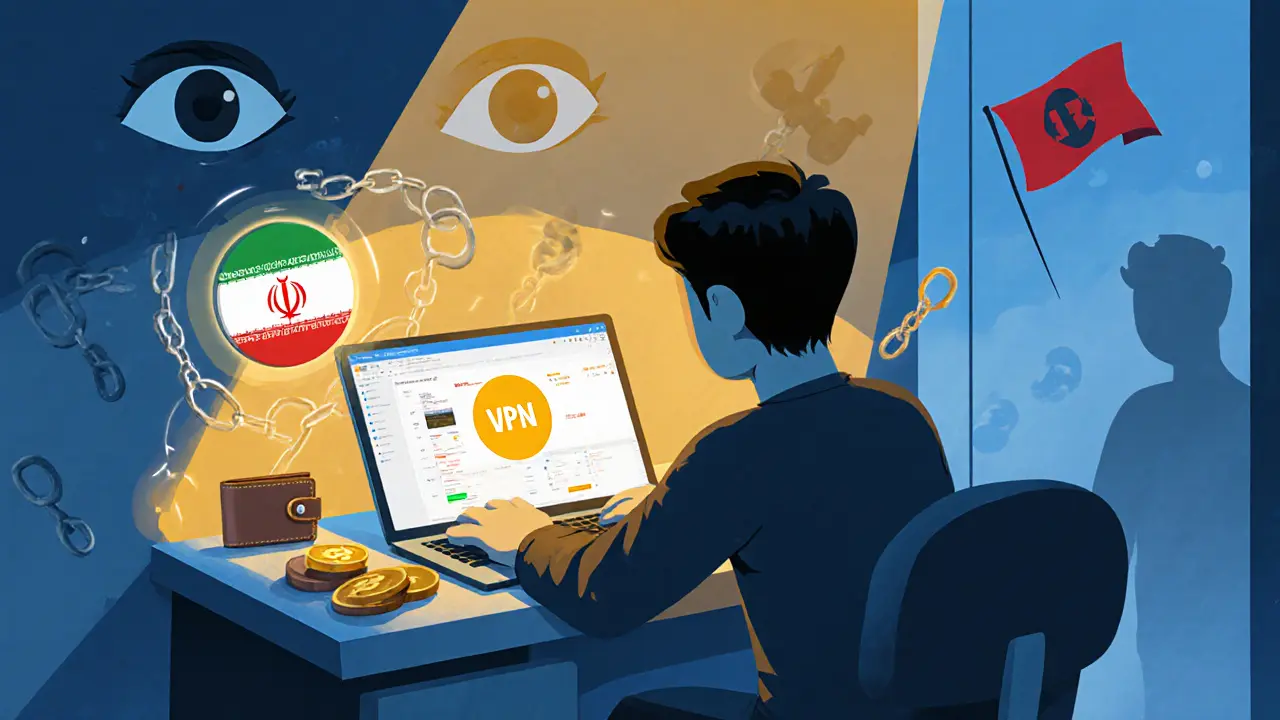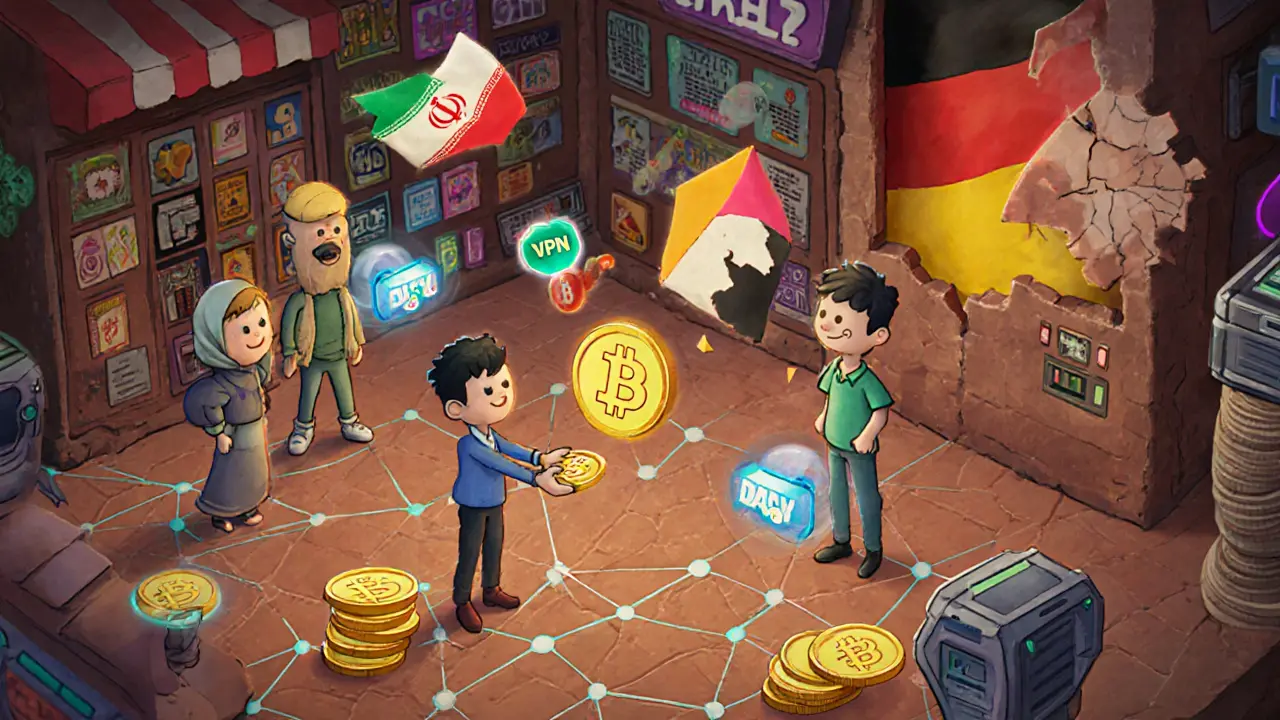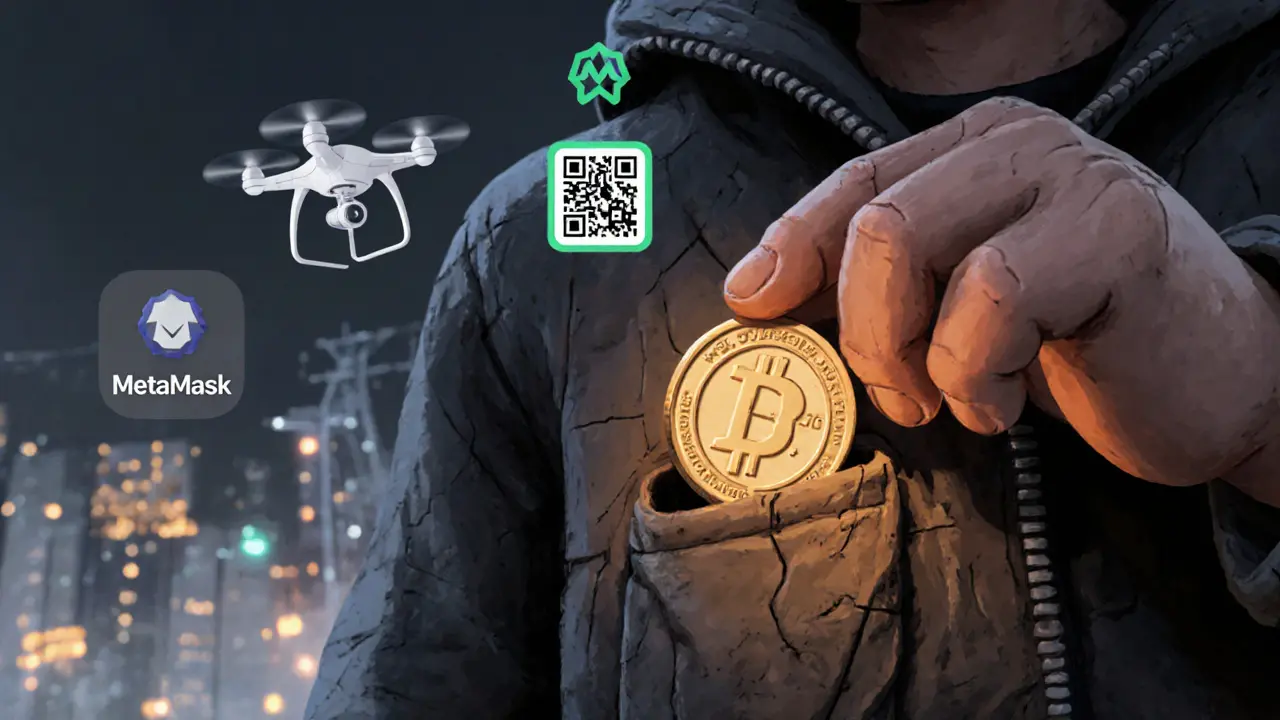DEX Access for Iranian Citizens: How to Use Decentralized Exchanges Amid Restrictions
 Mar, 23 2025
Mar, 23 2025
Iran DEX Gas Fee Estimator
Calculate Your Transaction Costs
This tool helps you estimate gas fees for DEX swaps using Polygon or Ethereum networks. For Iranian users, Polygon offers significantly lower costs and faster transactions compared to Ethereum mainnet.
Estimated Transaction Costs
Recommended for IranTotal Gas Fee
Polygon Network
0.00000000 MATIC
($0.00)
Transaction Time
Polygon Network
Under 15 seconds
Why Polygon is Better for Iranians
Low Cost: Transactions cost pennies (0.00000000 MATIC) versus Ethereum's $20+ fees
Fast Transactions: Confirms in under 15 seconds
Sanctions-Resistant: Not affected by US sanctions like Tether
Privacy: Easier to use with VPN due to minimal data footprint
For many Iranians, accessing global financial systems has become nearly impossible. Sanctions, banking blockades, and hyperinflation have turned cryptocurrency into a lifeline-not for speculation, but for survival. While centralized exchanges like Nobitex once dominated, recent crackdowns have forced users to look elsewhere. The truth? Decentralized exchanges (DEX) are now the most viable way for Iranian citizens to hold, trade, and move value without government oversight. But it’s not simple. It’s not safe. And it’s not legal under Iran’s current rules. Still, thousands are doing it-and succeeding.
Why Centralized Exchanges Are No Longer Safe
Nobitex used to be the go-to for Iranian crypto traders. With over 11 million users, it handled more than 87% of all local crypto transactions. But in June 2025, it got hacked. Over $90 million vanished. And that wasn’t the worst part. In July 2025, Tether froze 42 Iranian-linked wallets. More than half of them were tied directly to Nobitex. Some of those wallets had clear transaction links to IRGC-affiliated addresses flagged by Israeli counter-terror finance units. Suddenly, holding USDT on Nobitex wasn’t just risky-it was dangerous. Your money could vanish overnight, and no one would tell you why. The Central Bank of Iran (CBI) didn’t just watch. It acted. In January 2025, it declared itself the sole regulator of all cryptocurrency activity in the country. Every Iranian using crypto-whether on an exchange, wallet, or DEX-must now register with the CBI. The bank gets full access to your transaction history, wallet addresses, and personal data. If you’re using a centralized platform, they already know everything. There’s no hiding.How DEXs Bypass Government Control
Decentralized exchanges don’t have servers in Iran. They don’t ask for ID. They don’t store your funds. They don’t answer to Tehran. That’s the whole point. When you use a DEX like Uniswap, SushiSwap, or PancakeSwap, you connect your own wallet-MetaMask, Rabby, or Trust Wallet-and swap tokens directly on the blockchain. No middleman. No account to freeze. No data to hand over. But here’s the catch: the CBI still wants to track you. If you’re using a DEX from within Iran, your internet traffic still goes through Iranian ISPs. That means your IP address, device info, and even your wallet interactions can be logged. So how do people get around it? The answer: VPNs. Not just any VPN. Reliable, no-logs, obfuscated ones. Many Iranians use ExpressVPN, NordVPN, or Mullvad to mask their location. They connect to servers in Turkey, the UAE, or Germany, then access DEXs as if they’re in Europe or North America. It’s not perfect-but it works.The Polygon + DAI Shift: A Real-World Strategy
After the Tether freezes, something unexpected happened. Iranian crypto communities didn’t panic. They adapted. In July 2025, influencers, traders, and even state-aligned media started pushing one message: “Sell USDT. Buy DAI on Polygon.” Why? - USDT is controlled by Tether. Tether answers to U.S. regulators. If your wallet is flagged, your money disappears. - DAI is a decentralized stablecoin. It’s backed by crypto collateral, not a company. Tether can’t freeze it. - Polygon is fast, cheap, and not on the U.S. sanctions list. Transactions cost pennies and confirm in seconds. The result? Thousands of Iranians moved millions in value from Ethereum-based USDT to Polygon-based DAI. They didn’t need an exchange. They used DEXs like QuickSwap or SushiSwap on Polygon. They swapped USDT for DAI in their wallets. And they kept going. This wasn’t theory. It was survival. And it worked.
What You Need to Get Started
If you’re in Iran and want to use a DEX, here’s exactly what you need:- A wallet: MetaMask (with custom RPC for Polygon) or Rabby Wallet (better privacy features).
- A reliable VPN: Must support WireGuard or OpenVPN, with obfuscation. Avoid free services-they log everything.
- Some ETH or MATIC: You need gas to pay for swaps. Buy it via P2P platforms like LocalBitcoins or Paxful (using VPN), then send it to your wallet.
- A DEX: Use QuickSwap (Polygon), SushiSwap (Ethereum or Polygon), or 1inch (multi-chain).
- Install MetaMask or Rabby Wallet on your phone or browser.
- Connect to a trusted VPN. Choose a server outside Iran.
- Add the Polygon network to your wallet (RPC: https://polygon-rpc.com).
- Buy a small amount of MATIC via P2P (use a trusted seller with good reviews).
- Go to QuickSwap.finance, connect your wallet, and swap USDT for DAI.
- Store your DAI in your wallet. Don’t send it back to any Iranian exchange.
The Risks Are Real
This isn’t a game. The Iranian government has cracked down hard on crypto users. In December 2024, power outages hit major cities. Officials blamed illegal Bitcoin mining. They arrested people. They seized rigs. They fined families. In August 2025, Iran passed a new law: capital gains tax on crypto. Now, every profit you make from trading-on any platform-is taxable. The CBI will demand proof of income. If you’re using a DEX and they find out, you could face fines, asset seizure, or worse. And there’s no legal protection. If your wallet gets hacked, you have no recourse. If a DEX goes down, you lose access. There’s no customer service. No refund policy. Most Iranians who use DEXs treat it like cash: small amounts, short-term holds, quick swaps. They don’t store large sums. They don’t brag. They don’t link their real names to wallets.
What About Mining? Is That Still an Option?
Iran legalized mining in 2019-but only under strict conditions. Miners had to sell all their coins to the Central Bank at fixed prices. Energy tariffs were raised to make mining unprofitable. By 2025, most large-scale mining had gone underground. The government still hunts for illegal miners. They use satellite imagery to spot power anomalies. They raid homes. They confiscate hardware. Mining isn’t a solution. It’s a trap.What’s Next for Iranian Crypto Users?
The Iranian government is building its own digital financial infrastructure. The Cross-Border Interbank Messaging System (CIMS) is designed to bypass SWIFT. It’s already connected to sanctioned banks in China. But CIMS doesn’t help ordinary citizens. It helps the regime. Meanwhile, users keep adapting. They’re using stealth wallets, burner phones, and anonymous P2P networks. They’re learning to read blockchain analytics to avoid flagged addresses. They’re pooling resources to buy gas tokens in bulk. The future won’t be about big exchanges. It’ll be about personal sovereignty. DEXs, private wallets, and decentralized stablecoins are the tools. The people are the network.Final Reality Check
There’s no magic bullet. No app that makes this easy. No guarantee of safety. But for many Iranians, using a DEX isn’t about crypto-it’s about freedom. It’s about being able to keep your money when your country’s banks won’t let you touch it. If you’re one of them, know this: you’re not alone. Thousands are doing the same thing. They’re not perfect. They make mistakes. But they’re learning. And they’re surviving. Start small. Stay quiet. Use a VPN. Use DAI on Polygon. Don’t trust anyone. And never, ever send your private keys to anyone-even if they claim to be “support.” Your money. Your control. Your choice.Can I use DEXs legally in Iran?
No. Under Iran’s January 2025 regulations, all cryptocurrency activity must be licensed and reported to the Central Bank of Iran. Using a DEX without registration is illegal. However, enforcement is difficult because DEXs operate on public blockchains with no central servers. Many users bypass detection using VPNs, but the legal risk remains.
Which DEXs work best for Iranians?
QuickSwap on Polygon is currently the most popular choice. It’s fast, cheap, and avoids U.S.-sanctioned networks. SushiSwap and 1inch also work well across multiple chains. Avoid DEXs tied to Ethereum mainnet if you’re trading USDT-Tether’s freezing power makes it risky. Stick to DAI on Polygon.
Why is DAI preferred over USDT in Iran?
USDT is issued by Tether, a company subject to U.S. sanctions and regulatory control. In July 2025, Tether froze over 20 Iranian-linked wallets tied to Nobitex. DAI, by contrast, is decentralized-backed by crypto collateral, not a company. No single entity can freeze it. That makes DAI the only stablecoin Iranians can trust to stay accessible.
Do I need a VPN to use a DEX in Iran?
Yes. Iranian ISPs monitor and block access to most foreign crypto platforms. A reliable VPN masks your IP address and lets you connect as if you’re outside Iran. Without one, you’ll likely be blocked or flagged. Choose a no-logs VPN with obfuscation-free services are dangerous and often monitored.
Can the Iranian government track my DEX transactions?
They can’t see your wallet balance or trade history directly-but they can track your internet traffic. If you use a DEX without a VPN, your ISP may log your activity. If you buy crypto via P2P and link your real identity, that’s traceable too. To stay safe, use a burner phone, anonymous wallet, and never reuse addresses. Blockchain analysis tools can link wallets, so avoid sending funds to known exchange addresses like Nobitex.
Is it safe to hold crypto in Iran right now?
It’s safer than holding rials-but still risky. The government can seize assets if they prove you’re trading for profit. The new capital gains tax law means you could be fined. Use small amounts. Don’t store large sums in one wallet. Use DAI on Polygon. Avoid exchanges. Keep your private keys offline. Treat crypto like cash: use it, don’t hoard it.
Savan Prajapati
November 26, 2025 AT 16:55This is straight-up survival tech. No fluff, no BS. I’ve seen people in India lose everything to rigged exchanges - same story. DEXs are the only way out when the system’s rigged.
Michael Labelle
November 28, 2025 AT 14:28It’s wild to think that the only way someone can protect their savings is by using a VPN and a blockchain. The fact that this is normal now… it says everything about where we are.
Vance Ashby
November 28, 2025 AT 16:51DAI on Polygon = GOAT. 🚀 Just don’t forget to turn off your location services too. I’ve seen people get caught because they forgot to disable GPS on their burner phone. 😅
Brian Bernfeld
November 28, 2025 AT 19:26Let me be real - if you’re in Iran and you’re using a DEX right now, you’re not just a crypto user. You’re a digital freedom fighter. I’ve spent years teaching people how to self-custody, but seeing this? This is next-level resilience. The fact that they’re not just surviving but adapting - swapping USDT for DAI on Polygon like it’s a chess move? That’s genius. And no, it’s not ‘tech bro stuff.’ It’s life. You don’t get to choose your government. But you can choose where your money lives. That’s power.
Casey Meehan
November 29, 2025 AT 23:19Bro… you’re telling me people are using DEXes in Iran and not getting arrested? 😳 I thought the government had AI tracking every wallet. Also, why is everyone ignoring the fact that Polygon’s mainnet is still Ethereum-based? The sanctions still apply. 🤔
Tom MacDermott
November 30, 2025 AT 09:18Oh wow, another ‘crypto is freedom’ fairy tale. Let me guess - you also think using a VPN makes you a hacker? 🙄 The truth? Most Iranians using DEXes are just gambling with their life savings because they’re too lazy to learn how to trade rials properly. Also, DAI isn’t magic - it’s just another crypto token with a whitepaper. Don’t act like you’re saving lives when you’re just enabling financial delusion.
Martin Doyle
November 30, 2025 AT 20:51Tom’s full of it. This isn’t delusion - it’s adaptation. I’ve talked to guys in Tehran who moved $50k from USDT to DAI in one night after their wallets got frozen. That’s not gambling. That’s strategy. And yeah, they’re risking it - but what’s the alternative? Losing everything to inflation or a corrupt bank? No thanks.
Susan Dugan
December 1, 2025 AT 15:27Y’all need to stop acting like this is just about crypto. This is about dignity. Imagine waking up and your life’s savings are worth half of what they were yesterday - and the government says ‘sorry, you can’t touch it.’ So you go online, use a VPN, swap your USDT for DAI, and suddenly you can buy medicine, send money to your sister, or pay for your kid’s school. That’s not ‘delusion.’ That’s human ingenuity. And honestly? The fact that people are figuring this out without any help from tech giants? That’s the most beautiful thing I’ve seen in this space in years. Keep going. You’re not alone. 💪❤️